中国古代神话英文版
- 格式:ppt
- 大小:6.21 MB
- 文档页数:15
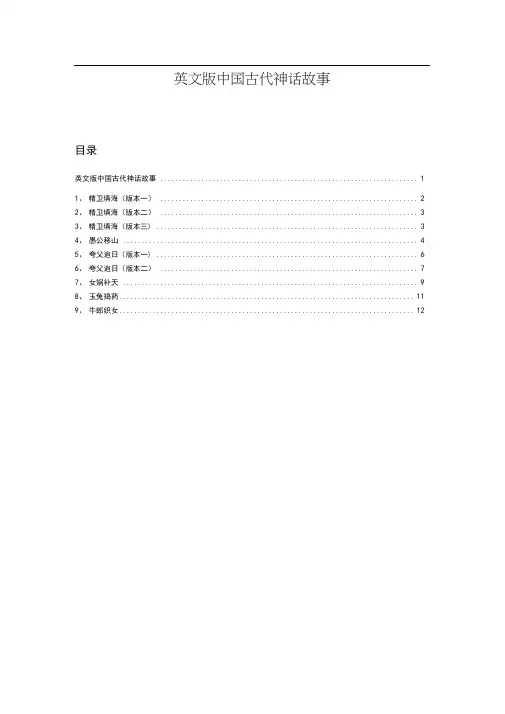
英文版中国古代神话故事目录英文版中国古代神话故事 (1)1、精卫填海(版本一) (2)2、精卫填海(版本二) (3)3、精卫填海(版本三) (3)4、愚公移山 (4)5、夸父追日(版本一) (6)6、夸父追日(版本二) (7)7、女娲补天 (9)8、玉兔捣药 (11)9、牛郎织女 (12)1、精卫填海(版本一)The bird JingWei trying to fill the SeaOnCeuPOn a time, the youn gest daughter Qf EmPerQr Yan, legendary ruler Qf PrimitiVe China, Went boating Qn the EaStern Sea. While She WaS enjoying herself, a StrQngWind rose Qn the Sea and her boat capsized。
JUSt before She WaS buried by the SUrgi ng waveS, her SPirit turned into a beautiful bird。
AS it fleW QVer the roaring sea, it Cried sadly in the SQUnd ”ji nWei, ji ngWei”。
That WaS Why PeQPIe called it " Jin gWei”。
The bird lived Qn a mountain n ear the sea。
It hated the Sea SQ much that it decided to fill it up。
EVery day, it fleW to and fro betWeen the mountain and the sea, Carrying in a tWig Qr a PebbIe from the mountain and dropp ing it into the sea.One day, the roari ng Sea Said to Jin gWei, "Poor little bird, StQP doing that meaningless thing! You'll never fill me up。
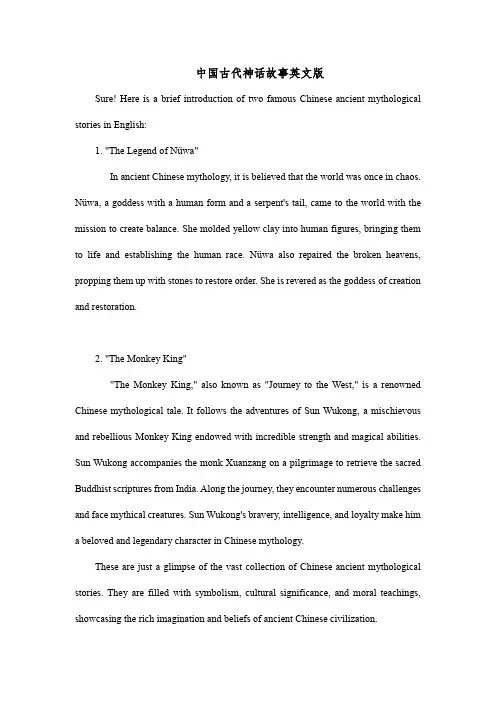
中国古代神话故事英文版Sure! Here is a brief introduction of two famous Chinese ancient mythological stories in English:1. "The Legend of Nüwa"In ancient Chinese mythology, it is believed that the world was once in chaos. Nüwa, a goddess with a human form and a serpent's tail, came to the world with the mission to create balance. She molded yellow clay into human figures, bringing them to life and establishing the human race. Nüwa also repaired the broken heavens, propping them up with stones to restore order. She is revered as the goddess of creation and restoration.2. "The Monkey King""The Monkey King," also known as "Journey to the West," is a renowned Chinese mythological tale. It follows the adventures of Sun Wukong, a mischievous and rebellious Monkey King endowed with incredible strength and magical abilities. Sun Wukong accompanies the monk Xuanzang on a pilgrimage to retrieve the sacred Buddhist scriptures from India. Along the journey, they encounter numerous challenges and face mythical creatures. Sun Wukong's bravery, intelligence, and loyalty make him a beloved and legendary character in Chinese mythology.These are just a glimpse of the vast collection of Chinese ancient mythological stories. They are filled with symbolism, cultural significance, and moral teachings, showcasing the rich imagination and beliefs of ancient Chinese civilization.。
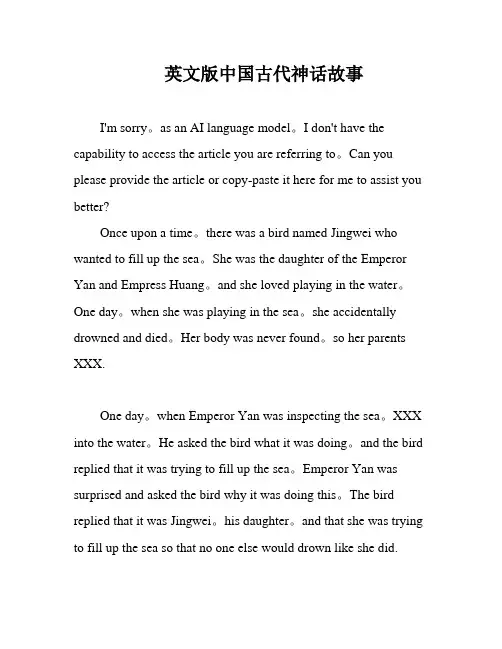
英文版中国古代神话故事I'm sorry。
as an AI language model。
I don't have the capability to access the article you are referring to。
Can you please provide the article or copy-paste it here for me to assist you better?Once upon a time。
there was a bird named Jingwei who wanted to fill up the sea。
She was the daughter of the Emperor Yan and Empress Huang。
and she loved playing in the water。
One day。
when she was playing in the sea。
she accidentally drowned and died。
Her body was never found。
so her parents XXX.One day。
when Emperor Yan was inspecting the sea。
XXX into the water。
He asked the bird what it was doing。
and the bird replied that it was trying to fill up the sea。
Emperor Yan was surprised and asked the bird why it was doing this。
The bird replied that it was Jingwei。
his daughter。
and that she was trying to fill up the sea so that no one else would drown like she did.XXX。
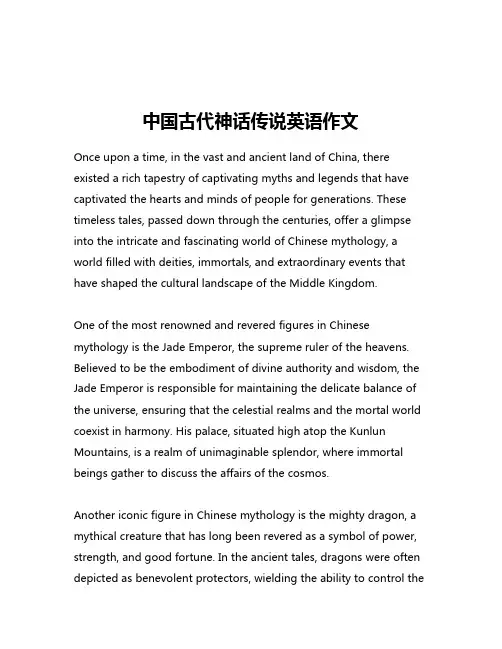
中国古代神话传说英语作文Once upon a time, in the vast and ancient land of China, there existed a rich tapestry of captivating myths and legends that have captivated the hearts and minds of people for generations. These timeless tales, passed down through the centuries, offer a glimpse into the intricate and fascinating world of Chinese mythology, a world filled with deities, immortals, and extraordinary events that have shaped the cultural landscape of the Middle Kingdom.One of the most renowned and revered figures in Chinese mythology is the Jade Emperor, the supreme ruler of the heavens. Believed to be the embodiment of divine authority and wisdom, the Jade Emperor is responsible for maintaining the delicate balance of the universe, ensuring that the celestial realms and the mortal world coexist in harmony. His palace, situated high atop the Kunlun Mountains, is a realm of unimaginable splendor, where immortal beings gather to discuss the affairs of the cosmos.Another iconic figure in Chinese mythology is the mighty dragon, a mythical creature that has long been revered as a symbol of power, strength, and good fortune. In the ancient tales, dragons were often depicted as benevolent protectors, wielding the ability to control theelements and bring prosperity to the people. The dragon's presence was believed to be a harbinger of auspicious events, and the sight of a dragon was said to bring good luck and blessings.One of the most captivating and enduring myths in Chinese folklore is the legend of the Monkey King, also known as Sun Wukong. This mischievous and powerful deity, born from a magical stone, embarks on a perilous journey to the West, accompanied by a Buddhist monk and two other companions. Together, they face a myriad of challenges and obstacles, from battling fierce demons to overcoming their own personal flaws, all while seeking enlightenment and the ultimate truths of the universe.Another iconic figure in Chinese mythology is the Moon Goddess, Chang'e, whose tragic love story has captured the imagination of countless generations. According to legend, Chang'e was a beautiful immortal who was forced to live on the moon after accidentally consuming an elixir of immortality. Her husband, the skilled archer Hou Yi, is said to have shot down nine of the ten suns in the sky, earning the gratitude of the people. However, their love story ends in heartbreak, as Chang'e is forever separated from her beloved Hou Yi, destined to gaze upon the earth from her lonely perch on the lunar surface.The pantheon of Chinese mythology is further enriched by thepresence of numerous other deities and immortals, each with their own unique stories and abilities. From the fearsome Monkey King to the benevolent Goddess of Mercy, Guanyin, these mythical beings have become deeply ingrained in the cultural fabric of China, shaping the beliefs, values, and traditions of the people.One of the most fascinating aspects of Chinese mythology is the way in which these ancient tales have continued to captivate and inspire modern audiences. From the enduring popularity of the Monkey King in contemporary media to the enduring reverence for the Jade Emperor and other deities, these mythological figures have transcended the boundaries of time and space, remaining relevant and resonant in the modern world.In conclusion, the rich and diverse tapestry of Chinese mythology is a testament to the enduring power of storytelling and the human imagination. These captivating tales, passed down through generations, offer a glimpse into the rich cultural heritage of the Middle Kingdom, and continue to inspire and captivate audiences around the world. Whether you are a scholar of ancient Chinese history or simply a lover of captivating stories, the myths and legends of China are sure to leave an indelible mark on your heart and mind.。
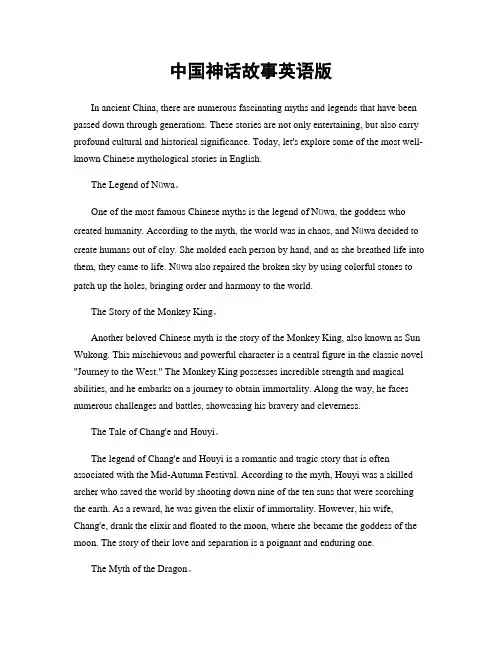
中国神话故事英语版In ancient China, there are numerous fascinating myths and legends that have been passed down through generations. These stories are not only entertaining, but also carry profound cultural and historical significance. Today, let's explore some of the most well-known Chinese mythological stories in English.The Legend of Nüwa。
One of the most famous Chinese myths is the legend of Nüwa, the goddess who created humanity. According to the myth, the world was in chaos, and Nüwa decided to create humans out of clay. She molded each person by hand, and as she breathed life into them, they came to life. Nüwa also repaired the broken sky by using colorful stones to patch up the holes, bringing order and harmony to the world.The Story of the Monkey King。
Another beloved Chinese myth is the story of the Monkey King, also known as Sun Wukong. This mischievous and powerful character is a central figure in the classic novel "Journey to the West." The Monkey King possesses incredible strength and magical abilities, and he embarks on a journey to obtain immortality. Along the way, he faces numerous challenges and battles, showcasing his bravery and cleverness.The Tale of Chang'e and Houyi。
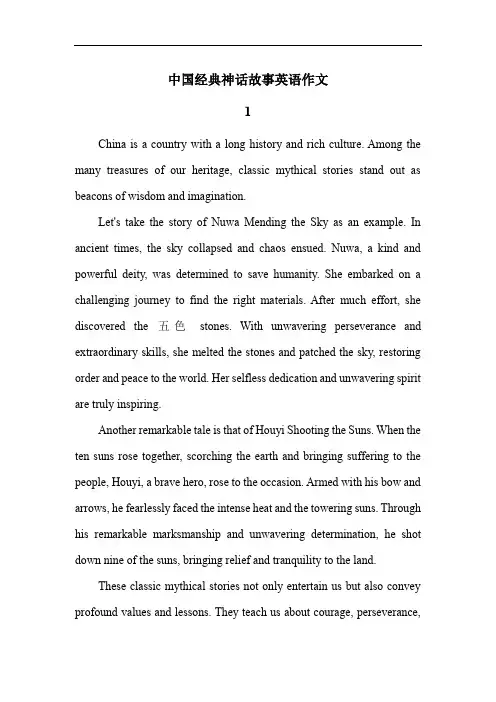
中国经典神话故事英语作文1China is a country with a long history and rich culture. Among the many treasures of our heritage, classic mythical stories stand out as beacons of wisdom and imagination.Let's take the story of Nuwa Mending the Sky as an example. In ancient times, the sky collapsed and chaos ensued. Nuwa, a kind and powerful deity, was determined to save humanity. She embarked on a challenging journey to find the right materials. After much effort, she discovered the五色stones. With unwavering perseverance and extraordinary skills, she melted the stones and patched the sky, restoring order and peace to the world. Her selfless dedication and unwavering spirit are truly inspiring.Another remarkable tale is that of Houyi Shooting the Suns. When the ten suns rose together, scorching the earth and bringing suffering to the people, Houyi, a brave hero, rose to the occasion. Armed with his bow and arrows, he fearlessly faced the intense heat and the towering suns. Through his remarkable marksmanship and unwavering determination, he shot down nine of the suns, bringing relief and tranquility to the land.These classic mythical stories not only entertain us but also convey profound values and lessons. They teach us about courage, perseverance,and the power of kindness. They are a testament to the wisdom and creativity of our ancestors, and they continue to fascinate and inspire us to this day.2China has a rich treasury of classic mythological tales that have been passed down through generations. These stories not only entertain but also convey profound meanings and values.One such tale is the story of Kuafu Chasing the Sun. Kuafu, a determined and fearless figure, embarked on an arduous journey to pursue the sun. His unwavering spirit and insatiable longing for light led him forward, regardless of the hardships and obstacles along the way. Despite knowing that the task was seemingly impossible and might cost him his life, he remained resolute. His unwavering pursuit symbolizes humanity's never-ending quest for knowledge and the unknown, as well as our indomitable will to overcome all odds.Another captivating story is that of Jingwei Filling the Sea. Jingwei, a tiny bird with an unwavering determination, was determined to fill the vast sea. Day after day, she carried twigs and pebbles in her beak and dropped them into the sea. Her perseverance and unwavering commitment were unwavering, never giving up in the face of the seemingly insurmountable task. This story teaches us that with unwavering determination and persistence, even the most difficult goals can beachieved.These classic Chinese mythological stories are not just tales of the past but are sources of inspiration and wisdom for us today. They encourage us to be courageous, persistent, and to never stop pursuing our dreams, no matter how challenging the path may seem.3China is a country with a long history and rich culture, and its classic myths are like precious jewels shining in the long river of time. One of the most touching stories is that of the Cowherd and the Weaver Girl. They fell in love deeply but were separated by the cruel rule of the gods. However, their love was so strong that they still met once a year on the Magpie Bridge. Their story is filled with both joy and sorrow. The joy of love and the sorrow of separation make people feel the power and preciousness of true love.Another remarkable tale is about Chen Xiang splitting the mountain to save his mother. Chen Xiang's bravery and filial piety are truly touching. Despite facing numerous difficulties and powerful enemies, he never gave up. His determination and love for his mother finally enabled him to rescue her. This story shows us the importance of family and the courage to fight for it.These classic myths not only bring us wonderful stories but also carry the wisdom and values of our ancestors. They make us understand thesignificance of love, bravery, and perseverance. Through these stories, we can feel the depth and charm of traditional culture, and they inspire us to cherish and pass on this precious heritage. Let us always keep these beautiful myths in our hearts and let the spirit of them light up our lives.4China is a country with a long history and rich cultural heritage. Among them, classic myths and stories have always been a fascinating part. These stories not only bring us wonderful imagination but also convey profound wisdom and enlightenment.Let's take the story of Pangu creating the world as an example. Pangu, with an axe in hand, split the chaos and created heaven and earth. This story inspires us to have the spirit of exploration and innovation. In modern society, when we face new challenges and unknown fields, we need to have the courage like Pangu to break through the old and create the new.Another story is about Dayu's control of the flood. Dayu spent years working tirelessly to tame the floods. His perseverance and determination teach us that as long as we have the will and keep persisting, no difficulty is insurmountable. This spirit is especially important in today's fast-paced life, where we often encounter setbacks and difficulties. Only by insisting on our goals can we achieve success.These classic mythical stories are like bright stars in the long river of history, guiding us forward. They remind us of our roots and inspire us tomove forward bravely in the pursuit of our dreams and the development of society. Let us carry forward the wisdom and spirit contained in these stories and create a better future.5Chinese classic myths have always been a captivating part of our cultural heritage, carrying profound meanings and values. Take the tale of Chang'e flying to the moon, for instance. Chang'e, out of her longing for a better and more peaceful life, chose to leave the earthly realm and ascend to the moon. This story reflects the deep aspiration of ancient people for a beautiful and ideal existence. It shows that humans have an innate yearning for something beyond the mundane and a pursuit of a higher quality of life.Another remarkable legend is that of Shennong tasting hundreds of herbs. Shennong, with his fearless spirit of exploration and selfless dedication, ventured into the unknown to discover the medicinal properties of various plants. His actions not only demonstrated great courage but also emphasized the importance of sacrificing for the well-being of others. This legend has inspired generations to brave difficulties and contribute to the welfare of society.These classic myths are not merely tales but reservoirs of wisdom and inspiration. They shape our values, ignite our imagination, and connect us to our ancestors' profound thoughts and emotions. Through these stories, we understand the hopes, dreams, and virtues of our predecessors, and theycontinue to guide us on our journey towards a better future.。
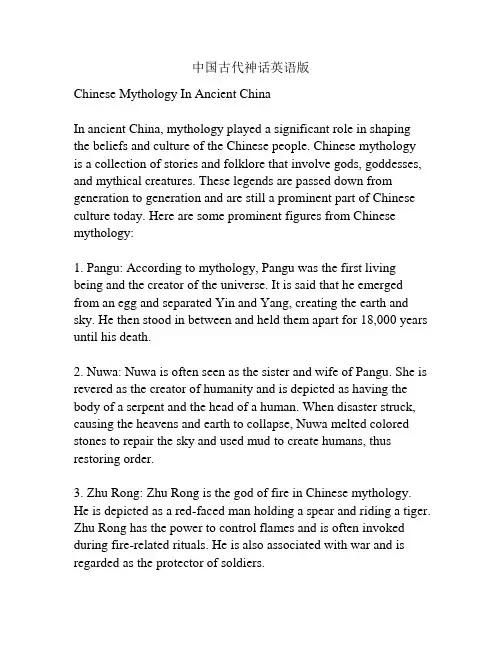
中国古代神话英语版Chinese Mythology In Ancient ChinaIn ancient China, mythology played a significant role in shaping the beliefs and culture of the Chinese people. Chinese mythologyis a collection of stories and folklore that involve gods, goddesses, and mythical creatures. These legends are passed down from generation to generation and are still a prominent part of Chinese culture today. Here are some prominent figures from Chinese mythology:1. Pangu: According to mythology, Pangu was the first living being and the creator of the universe. It is said that he emerged from an egg and separated Yin and Yang, creating the earth and sky. He then stood in between and held them apart for 18,000 years until his death.2. Nuwa: Nuwa is often seen as the sister and wife of Pangu. She is revered as the creator of humanity and is depicted as having the body of a serpent and the head of a human. When disaster struck, causing the heavens and earth to collapse, Nuwa melted colored stones to repair the sky and used mud to create humans, thus restoring order.3. Zhu Rong: Zhu Rong is the god of fire in Chinese mythology. He is depicted as a red-faced man holding a spear and riding a tiger. Zhu Rong has the power to control flames and is often invoked during fire-related rituals. He is also associated with war and is regarded as the protector of soldiers.4. Nüwa: Nüwa, also known as the mother goddess, is portrayed asa beautiful woman with the body of a snake. She is believed to have created humans out of clay and breathed life into them. Nüwa is also credited with repairing the pillars of heaven after they were damaged, preventing the sky from collapsing.5. Houyi: Houyi is a legendary archer who saved humanity from the ten suns that threatened to scorch the earth. He shot down nine suns, leaving only one in the sky, bringing relief to the people. Houyi is also associated with the myth of Chang'e, the goddess of the moon.These are just a few examples of the many gods, goddesses, and mythical beings from Chinese mythology. Each of these figures has their own unique stories and characteristics that have been ingrained in Chinese culture for centuries. The mythology continues to be a source of inspiration and fascination for people around the world who seek to learn more about ancient Chinese beliefs and folklore.。
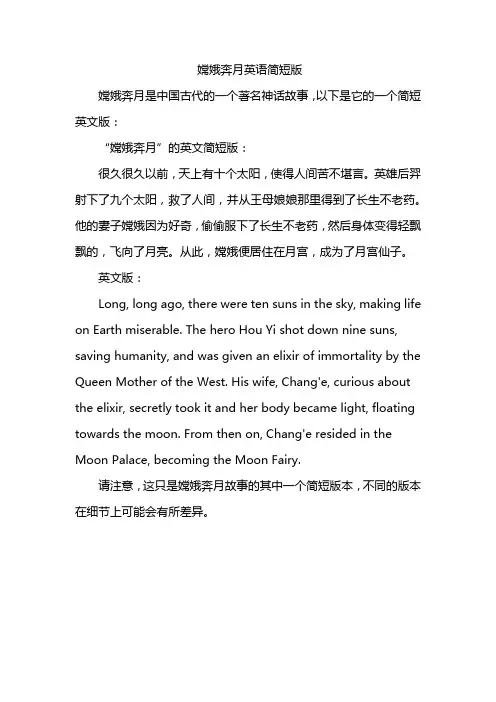
嫦娥奔月英语简短版
嫦娥奔月是中国古代的一个著名神话故事,以下是它的一个简短英文版:
“嫦娥奔月”的英文简短版:
很久很久以前,天上有十个太阳,使得人间苦不堪言。
英雄后羿射下了九个太阳,救了人间,并从王母娘娘那里得到了长生不老药。
他的妻子嫦娥因为好奇,偷偷服下了长生不老药,然后身体变得轻飘飘的,飞向了月亮。
从此,嫦娥便居住在月宫,成为了月宫仙子。
英文版:
Long, long ago, there were ten suns in the sky, making life on Earth miserable. The hero Hou Yi shot down nine suns, saving humanity, and was given an elixir of immortality by the Queen Mother of the West. His wife, Chang'e, curious about the elixir, secretly took it and her body became light, floating towards the moon. From then on, Chang'e resided in the Moon Palace, becoming the Moon Fairy.
请注意,这只是嫦娥奔月故事的其中一个简短版本,不同的版本在细节上可能会有所差异。
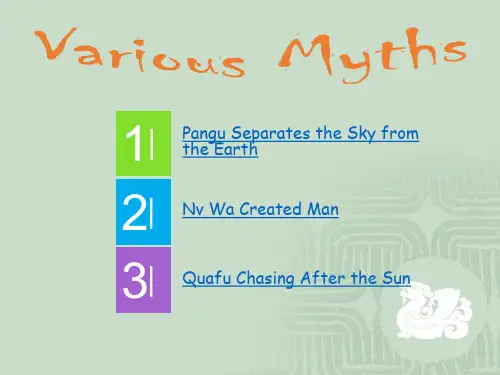
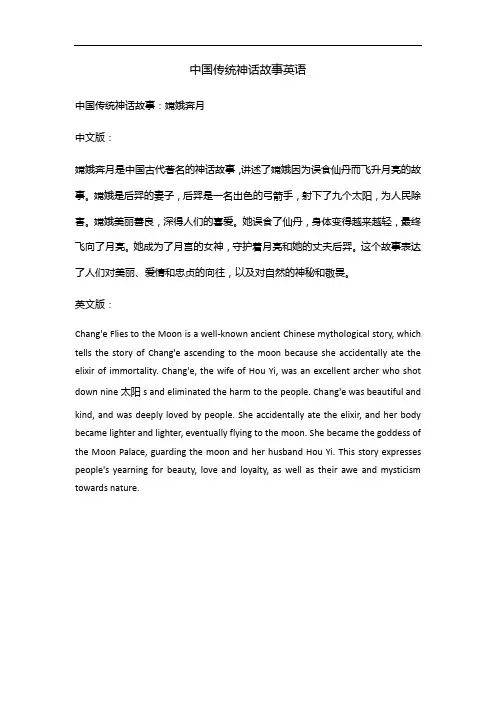
中国传统神话故事英语中国传统神话故事:嫦娥奔月中文版:嫦娥奔月是中国古代著名的神话故事,讲述了嫦娥因为误食仙丹而飞升月亮的故事。
嫦娥是后羿的妻子,后羿是一名出色的弓箭手,射下了九个太阳,为人民除害。
嫦娥美丽善良,深得人们的喜爱。
她误食了仙丹,身体变得越来越轻,最终飞向了月亮。
她成为了月宫的女神,守护着月亮和她的丈夫后羿。
这个故事表达了人们对美丽、爱情和忠贞的向往,以及对自然的神秘和敬畏。
英文版:Chang'e Flies to the Moon is a well-known ancient Chinese mythological story, which tells the story of Chang'e ascending to the moon because she accidentally ate the elixir of immortality. Chang'e, the wife of Hou Yi, was an excellent archer who shot down nine太阳s and eliminated the harm to the people. Chang'e was beautiful and kind, and was deeply loved by people. She accidentally ate the elixir, and her body became lighter and lighter, eventually flying to the moon. She became the goddess of the Moon Palace, guarding the moon and her husband Hou Yi. This story expresses people's yearning for beauty, love and loyalty, as well as their awe and mysticism towards nature.。

英文版中国神话故事Deep within the rich cultural heritage of China, lie enchanting tales that have captivated the imagination of countless individuals for generations. These myths and legends, often passed down through oral traditions andlater recorded in literary works, offer a window into the ancient world of gods, monsters, heroes, and fairies.One such tale that stands out is the legend of the Dragon King and the Jade Emperor. According to this story, the Jade Emperor, the supreme Deity in Chinese mythology, summoned all the gods and monsters of the heavens and earth to a grand assembly. Among them was the Dragon King, who was renowned for his power and wisdom. The Jade Emperor challenged the Dragon King to a contest of wisdom, promising him the rule of all the waters if he prevailed. The Dragon King accepted the challenge and, through his cunning and wit, outsmarted the Jade Emperor, earning the right to rule over all the rivers and oceans. This story is not only a testament to the Dragon King's cleverness and prowess but also a symbol of the respect and reverence accorded to water in Chinese culture.Another fascinating tale is the legend of Ne Zha, the god of war. According to legend, Ne Zha was born with a deformed body but possessed immense strength and courage. He was renowned for his bravery and became a general in the army of the Zhou dynasty, fighting valiantly against the oppressive Shang dynasty. His most famous feat was the conquest of the nine dragons, symbolizing the overthrow of the Shang dynasty's tyranny. Ne Zha's story is a powerful reminder of the importance of perseverance and courage in the face of adversity.The enchanted tales of ancient China are not just stories; they are areflection of the values, beliefs, and aspirations of the Chinese people. These myths and legends have been passed down through the ages, serving as a bridge between the past and the present, connecting generations of Chinese with their rich cultural heritage.These stories are often retold in modern times, notjust to preserve the cultural legacy but also to inspire and motivate people. The characters and themes from these myths and legends find their way into movies, books, andother forms of media, resonating with audiences across the globe.The enchanted tales of ancient China continue to captivate and inspire, serving as a reminder of the rich cultural heritage that has shaped the identity of the Chinese people. These myths and legends are not just stories; they are a part of our history, culture, andspirit.**中国古代神话故事的魅力**在中国丰富的文化遗产深处,隐藏着令人着迷的神话故事,这些故事代代相传,通过口头传统和文学作品记录下来,为无数人提供了探索古代神仙、怪兽、英雄和仙女世界的窗口。
英文版中国古代神话故事目录英文版中国古代神话故事 (1)1、精卫填海(版本一) (2)2、精卫填海(版本二) (3)3、精卫填海(版本三) (3)4、愚公移山 (4)5、夸父追日(版本一) (6)6、夸父追日(版本二) (7)7、女娲补天 (9)8、玉兔捣药 (11)9、牛郎织女 (12)The bird Jingwei trying to fill the seaOnce upon a time, the youngest daughter of Emperor Yan, legendary ruler of primitive China, went boating on the Eastern Sea. While she was enjoying herself, a strong wind rose on the sea and her boat capsized. Just before she was buried by the surging waves, her spirit turned into a beautiful bird. As it flew over the roaring sea, it cried sadly in the sound "jinwei, jingwei". That was why people called it "Jingwei".The bird lived on a mountain near the sea. It hated the sea so much that it decided to fill it up. Every day, it flew to and fro between the mountain and the sea, carrying in a twig or a pebble from the mountain and dropping it into the sea.One day, the roaring sea said to Jingwei, "Poor little bird, stop doing that meaningless thing! You'll never fill me up." Jingwei replied, "I'll fill you up no doubt! I will, even if it'll take me thousands of years! I'll fight on until doomsday!"The brave little bird kept carrying twigs and pebbles from the mountain to the Eastern Sea without taking a rest.From this fable comes the idiom "The bird Jingwei trying to fill the sea". We use it to describe people who are firm and indomitable and will not stop until they reach their goal.英文:Once upon a time, Yan has a small daughter, Her name is baby girl, he loved his little daughter, Yan often play with the girls, but the terrible thing happened, girls playing in the sea, unfortunately, dead water, and then She turned into a bird, named Jingwei, Yan sad day Jade Bird watching it, and finally decided to make this Jingwei filled the sea, so that he no longer claimed more lives!中文:从前,有1个女孩叫做精卫,她很爱自己的父亲炎帝,他们经常在一起玩,每天都很开心。
The Legend of Nüwa Repairing the SkyIn the ancient Chinese mythology, there lies a captivating tale of bravery and selflessness, narrated through the ages—the legend of Nüwa, the goddess who repaired the sky. This enchanting story embodies the resilience and creativity of the ancient Chinese people, blending mythology with their profound beliefs and aspirations.Long ago, in a time when the heavens and earth were still in their infancy, the sky was not as solid as it is today. A colossal calamity struck the world, causing the heavens to rupture, allowing torrents of water, fire, and other celestial elements to pour down upon the earth, wreaking havoc and devastation. Crops failed, homes crumbled, and creatures struggled for survival.In the midst of this chaos, Nüwa, a goddess of exceptional strength and wisdom, emerged. Seeing the misery of her people, she vowed to restore order to the universe. Nüwa knew that only the most extraordinary materials could mend the ruptured sky. She set out on a perilous journey, seeking out the four divine pillars of the world, which were believed to hold the heavens in place, and a vast amount of colorful stones, each imbued withthe essence of the five elements: wood, fire, earth, metal, and water.After traversing mountains, crossing raging rivers, and facing countless challenges, Nüwa finally collected all the necessary materials. With the help of divine beasts and the wisdom of the ancients, she began the arduous task of repairing the sky. She used the four divine pillars to stabilize the universe's foundation and carefully placed the colorful stones in the gaps of the heavens, each stone resonating with the harmony of the cosmos.As Nüwa worked tirelessly, the skies gradually healed, the celestial elements returned to their rightful places, and the earth once again basked in the warmth of the sun and the nourishment of the rain. The people rejoiced, celebrating Nüwa as a heroine, her name etched forever in the annals of Chinese mythology.The legend of Nüwa repai ring the sky not only reflects the ancient Chinese people's awe of nature and their desire for order and stability, but also embodies their admiration for bravery, wisdom, and selflessness. It serves as a timeless reminder of the power of determination and the importance of unity in the face of adversity.。
英文版中国古代神话故事Word版Title: Chinese Ancient Mythology TalesIntroduction: Chinese ancient mythology is a rich and colorful treasure trove of stories that have been passed down through generations. These tales often depict gods, goddesses, heroes, and magical creatures, reflecting the beliefs, values, and cultural heritage of ancient China. In this article, we will explore some of the most captivating and enduring Chinese ancient mythological stories.The Legend of Nüwa: In ancient times, the world was in chaos, withno humans inhabiting the earth. Nüwa, a goddess with the body of a snake and the head of a human, saw the desolation and decided to create human beings. She molded clay into human figures and brought them to life. These early humans multiplied rapidly, and the world became populated.Nüwa's creation of humans is seen as a significant event in Chinese mythology, symbolizing the birth of humanity.The Legend of Houyi and Chang'e: Houyi, a skilled archer, saved the earth from ten suns that scorched the land. As a reward, the Queen Mother of the West gifted him an elixir of immortality. However, Houyi's wife, Chang'e, consumed the elixir and flew to the moon, becoming the Moon Goddess. Houyi was devastated and began offering sacrifices to his wife on every full moon. This legend explains the origin of the Mid-Autumn Festival, during which people offer mooncakes to Chang'e and celebrate family reunion.The Story of the Monkey King: The Monkey King, also known as Sun Wukong, is one of the most well-known characters in Chinese mythology.Born from a stone, the Monkey King possessed supernatural powers and intelligence. He embarked on a journey to seek immortality and gainedthe title "Great Sage, Equal of Heaven." The Monkey King played a significant role in the famous novel "Journey to the West," where he accompanied the monk Xuanzang on a pilgrimage to retrieve Buddhist scriptures.The Legend of the Eight Immortals: The Eight Immortals are a groupof legendary figures with extraordinary abilities, each representing different virtues. They include Li Tieguai, Zhang Guolao, Lan Caihe, Han Xiangzi, He Xiangu, Cao Guojiu, Lu Dongbin, and Zhongli Quan. Together, they embarked on various adventures and helped people in need. The story of the Eight Immortals symbolizes the pursuit of enlightenment and the importance of moral conduct in Chinese culture.The Legend of the Dragon: Dragons hold a prominent place in Chinese mythology, symbolizing power, strength, and good fortune. The Dragon Kings, rulers of the seas, were believed to control rainfall and protect people from floods. The Dragon Dance, a popular Chinese tradition during festivals, depicts a dragon made of colorful fabric carried by a team of dancers. The dragon's dance is believed to bring good luck and blessings to the community.Conclusion: Chinese ancient mythology is a treasure trove of captivating stories that continue to fascinate people worldwide. These tales reflect the rich cultural heritage and spiritual beliefs ofancient China. From the creation of humans by Nüwa to the adventures of the Monkey King, each story carries valuable lessons and moral teachings.Exploring these ancient mythological tales allows us to appreciate the wisdom, imagination, and creativity of ancient Chinese civilization.。
女娲补天英文版故事女娲补天的故事是中国古代传说中的一个神话故事,但没有一个特定的英文版翻译。
以下是这个故事的一个大致梗概的英文版:In ancient Chinese mythology, there's a story about Nüwa, a goddess credited with creating humans and repairing the sky.Long ago, the sky was supported by four enormous pillars. One day, disaster struck and the pillars collapsed, causing chaos in the world. Fearing further catastrophe, Nüwa melted colorful stones to mend the broken heavens.Taking molten rock and using it to repair the damaged sky, Nüwa patched up the rifts in the heavens. She worked tirelessly, setting the sky right by day and resting only when night fell. Her dedication and effort were vital to restoring order to the world.Legend has it that Nüwa's repairs were not only functional but also beautiful. She carefully arranged the stones, creating a breathtaking mosaic that adorned the heavens. Her skill and determination saved the world from further calamity and brought harmony back to the universe.The story of Nüwa mending the sky is a tale of resilience, determina tion, and the belief that even the greatest challenges can be overcome with dedication and perseverance.这个故事讲述了女娲补天的传说,但不同版本可能会有细微的差别。
The Splendor of Ancient Chinese Mythology Deep within the misty folds of history, the ancient Chinese mythology stands tall, a tapestry of legends and deities that captivate the imagination. These stories, passed down through generations, are not just tales of gods and monsters but also reflections of the rich cultural and spiritual heritage of the Chinese people.One of the most enduring legends is the story of the Creation, where Pangu, the primal deity, cleaved the chaos, separating the heavens from the earth. His body transformed into the landscape of the world, with his breath becoming wind and clouds, his voice resonating as thunder, and his eyes shining as the sun and moon. This narrative not only explains the origins of the universe but also embodies the Chinese philosophy of harmony and balance.Another notable figure from mythology is the Jade Emperor, the supreme deity in the pantheon of Chinese gods. He presided over the heavens, overseeing the fate of mortals and deities alike. His court was attended by various gods and goddesses, each with their own domain and responsibilities. These deities often intervened in humanaffairs, rewarding the virtuous and punishing the wicked, reflecting the Chinese belief in karmic retribution.The world of Chinese mythology is also populated by mythical creatures, ranging from the fearsome dragon and phoenix to the enigmatic qilin and xiuhou. These creatures were often depicted in art and literature, symbolizing various aspects of Chinese culture and belief. For instance, the dragon, a symbol of power and good fortune, was often associated with royalty and imperial authority.In addition to these larger-than-life beings, Chinese mythology is also rich in tales of heroes and heroines. These individuals, often mortals with divine blood or powers, embarked on quests to vanquish evil forces orprotect the innocent. Their adventures were filled withperil and excitement, testing their courage, wisdom, and moral fortitude.The influence of Chinese mythology can be seen in various aspects of Chinese culture. It has inspired countless works of art, literature, and cinema, providing a rich source of inspiration for creators. Moreover, thevalues and beliefs embodied in these myths have shaped the ethical and moral outlook of the Chinese people.In conclusion, the ancient Chinese mythology is a treasury of legends and deities that reflect the deep cultural and spiritual roots of the Chinese nation. These stories, passed down through the ages, continue to captivate our imaginations and inspire us to seek meaning and purpose in our lives.**中国古代神话的辉煌**在历史的迷雾深处,中国古代神话巍然屹立,是一幅充满传奇色彩的神灵画卷,引人无限遐想。